Download - Health Sciences - Curtin University
Download - Health Sciences - Curtin University
Download - Health Sciences - Curtin University
Create successful ePaper yourself
Turn your PDF publications into a flip-book with our unique Google optimized e-Paper software.
SCHOOL POLICY ON STUDENT ACADEMIC CONDUCTIntroductionA <strong>University</strong> is not just a teaching institution but may be described as a community ofscholars where staff and students pursue knowledge through scholarship and research. Itfollows that within such a community truthfulness is one of the highest values. To falsify,misreport or distort the results of one‟s endeavours, or to present another‟s‟ work as one‟sown, are the most serious misdemeanours that one can commit as a scholar. Misconduct ofthis sort is treated very seriously within the <strong>University</strong> context. Additionally, psychologistsbecause of their research and work with human behaviour, have a particular responsibility toadopt honest and ethical practices.While it is often obvious to students that certain types of behaviour, such as cheating inexaminations, are examples of academic misconduct, there are some areas where what isunacceptable is not so clear.This document represents the School of Psychology‟s policy on ethical student academicconduct. It is designed to make you aware of what behaviour constitutes misconduct and todetail the consequences of such behaviour. If, during the course of your studies, you are inany doubt about what is academically permissible, you should discuss the matter with yourlecturer or tutor before submitting your work for assessment.Examinations and TestsUnless specifically stated by the examiner, books, notes, calculators, and other aids must notbe taken into the examination room, Copying answers from another student's paper, orpermitting another student to copy your answer, or endeavouring to communicate withanother student during examination is cheating.In respect to take-home tests the material returned must be entirely the students own work.Using the notes, calculation, computer print-outs, etc., of another student, or providing yourown to another student are examples of collusion and this is misconduct. Collusion occurswhen students work together, or exchange material, and then present this combined effort asif it were produced by each student individually.Collusion needs to be clearly distinguished from cooperation, which is encouraged within theSchool. Discussing lecture material, text books, reference readings and other aspects of thecourse work can be a very effective way of learning and clarifying your own ideas. So longas you report what you have learned and present it in your own way you will not be guilty ofcollusion. How you learned the material is irrelevant, how you present it is vital. You mustbe the author and the expression of ideas must be your own.Essays, Theses, Dissertations and Written AssignmentsPlagiarism is a very serious form of academic misconduct. The penalties for plagiarism aresevere.Plagiarism occurs when the written work of another is presented as one‟s own. This writtenwork may be from books, journal articles, or other published material or it may be anotherpresent or past student‟s written work. Note that paraphrasing another‟s work is plagiarism.When you use the words of another person, as in a direct quotation or if you paraphrase animportant point, or summarise the ideas of another person, you must acknowledge this bythe appropriate use of citations, quotation marks and referencing. The key issue is54<strong>Curtin</strong> <strong>University</strong> is a trademark of <strong>Curtin</strong> <strong>University</strong> of Technology.CRICOS Provider Code 00301J (WA), 02637B (NSW)



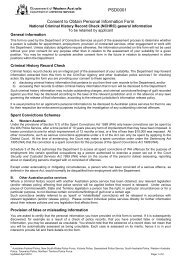
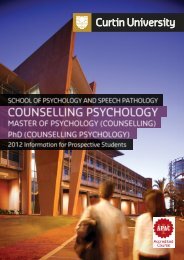
![Mental health commission report July 2010 - June 2011 [.pdf]](https://img.yumpu.com/50755705/1/184x260/mental-health-commission-report-july-2010-june-2011-pdf.jpg?quality=85)
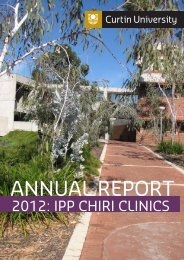
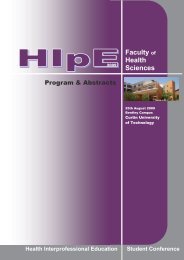
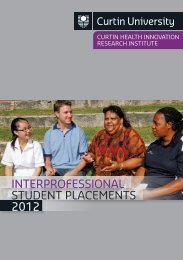
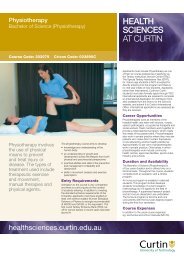
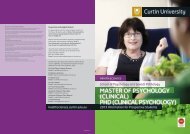
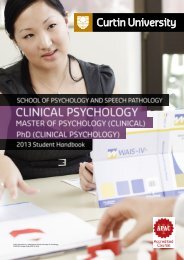
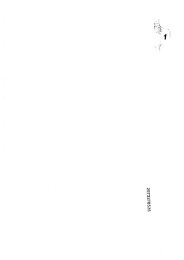
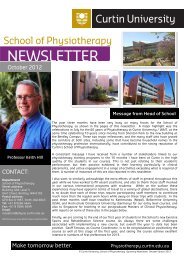
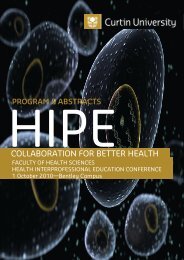
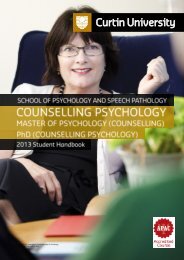
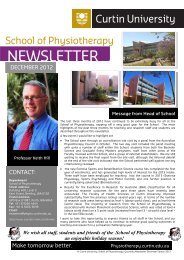
![2007 Annual Report [.pdf] - Health Sciences - Curtin University](https://img.yumpu.com/44476724/1/184x260/2007-annual-report-pdf-health-sciences-curtin-university.jpg?quality=85)